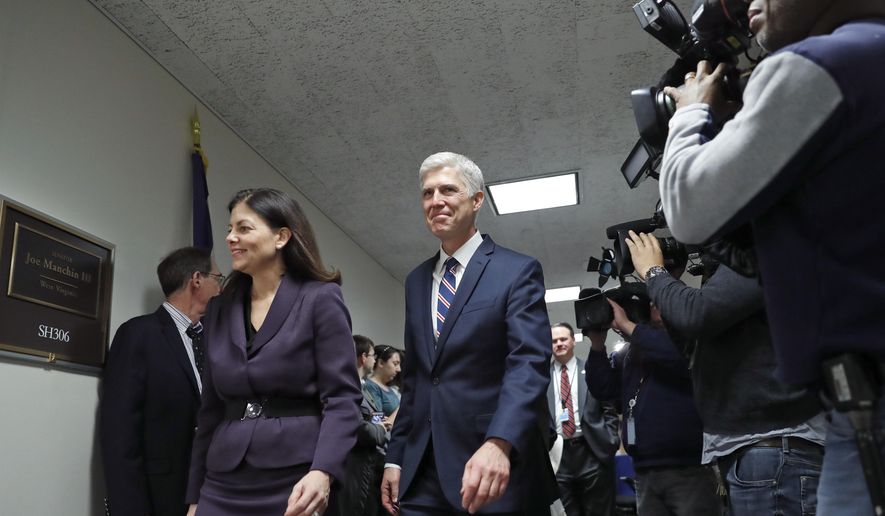OPINION:
Presidents only occasionally hit home runs. In their league, curve balls simply vanish over the plate, fast balls come in with blinding speed, and sliders escape even a presidential slugger’s eye.
But Donald Trump, rookie or not in the highest of all leagues, knocked one out of the park with his nomination of Neil Gorsuch to the U.S. Supreme Court. The Knot Hole Gang beyond the fence is still searching the weeds for the ball.
Praise for the selection comes to the president just when he needs it, after several days of non-stop vituperation for the ham-handed execution of his order suspending the intake of refugees of seven nations first deemed by the Obama administration as breeding grounds for radical Islamic terrorists.
Mr. Gorsuch arrives in Washington with the Harvard education that seems to be requisite for the court. He is expected to join five Roman Catholics and three Jews as the only Protestant (Episcopalian) justice. One admiring Democratic lawyer calls him “the unassailable nominee.”
If only. Such is the partisan divide in America at the moment that John Jay, Learned Hand or Louis Brandeis could not pass the inspection of the pickers of tiny nits in the U.S. Senate without an epic struggle. But Mr. Gorsuch, 49, is the distinguished choice in the mold of the late Antonin Scalia who reveres the Constitution as it was written, with none of the ghostly “penumbras” and gauzy “emanations” that certain lesser jurists have insisted they see in the founding document.
Mr. Gorsuch has been an anchor of the 10th U.S. Court of Appeals, based in Denver, since he was appointed in 2006 by President George W. Bush. He is admired by other lawyers for his sharply written prose, further in the mold of Antonin Scalia; his arguments for religious liberty at a time when many liberals are determined to bend faith, if it must be tolerated at all, to the will of the state, and for his skepticism of the law that cedes too much power and authority to the administrative state.
In his concurring opinion in Hobby Lobby v. Sebelius, later upheld by the Supreme Court, he held for the right of a company to choose not to participate, as a right of conscience, in the Obamacare mandate for contraceptives. Such religious convictions may be “contestable” or “unpopular,” he wrote, “[but] no one disputes that they are sincerely held religious beliefs.” The Religious Freedom Restoration Act “doesn’t just apply to protect popular religious beliefs,” he wrote, “it does perhaps its most important work in protecting unpopular religious beliefs, vindicating this nation’s long-held aspiration to serve as a refuge of religious tolerance.”
The judge’s reverence for the Constitution comes through in nearly everything he writes. “Ours is the job of interpreting the Constitution,” he wrote in one opinion. “And that document isn’t some inkblot on which litigants may project their hopes and dreams for a new and perfected tort law, but a carefully drafted text judges are charged with applying according to its original meaning.”
He observed that the Founding Fathers debated a role for the judiciary that would have given them the authority to write legislation — an authority certain judges would arrogantly assume in our own time — but they instead “quite deliberately chose one that carefully separated [the powers].”
Donald Trump thus makes good on his promise to appoint Supreme Court justices in the tradition and mold of Justice Scalia. “The nomination is also a chance for the White House to rebound from some of its early blunders,” The Wall Street Journal observes,” and it will be “an acute and painful reminder for Democrats of the price of Hillary Clinton’s defeat.”
If Mr. Gorsuch is confirmed, as expected, it will be an occasion for defenders of the Constitution to celebrate. Penumbra and Emanation, the top of the batting order for the liberal abusers of the Constitution, strike out.




Please read our comment policy before commenting.